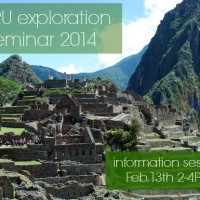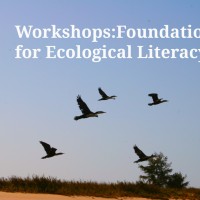Nature Consortium is a 501©(3) non-profit organization. Printed on 100% post-consumer waste.
CONNECTING PEOPLE, ARTS & NATURE
Nature Consortium
4408 Delridge Way SW #107
Seattle, WA 98106
(206) 923-0853 WWW.NATUREC.ORG
Nature Consortium, a registered 501c(3) Seattle based not for profit, is in search of a Restoration Program Manager to work within our Urban Forest Restoration Program. This position will start the week of June 10th and is a full time position.
Position Overview: The Restoration Program Manager (RPM) is responsible for developing habitat restoration projects within the upland forest of the West Duwamish Greenbelt for implementation by community volunteers through events in which the RPM shares responsibility of managing and leading with the Field Coordinator. The RPM’s key responsibilities include teaching environmental education lessons in the field and the classroom to diverse audiences, developing fee for service relationships, managing programmatic operations, and undertaking restoration project management actions such as project development and implementation. Duties also include community outreach, data management, budgeting and reporting, communications with partner organizations and agencies, and occasional grant writing.
This position reports directly to the Restoration Program Director and serves as an advisor and in field supervisor for the Field Coordinator. The RPM will work closely with the Restoration Program Director in project implementation and program facilitation; coordination between other staff members as well as community partners, agencies, and volunteers. The RPM will work at project sites within the West Duwamish Greenbelt and Duwamish Head as well as with local West Seattle public and private schools and community centers. The successful candidate will work both in our office and in the field at our restoration sites. Some Saturdays and evenings are required.
Duties and Responsibilities:
Program Implementation:
Manage volunteer events on a rotating basis during the week and on Saturdays.
Coordinate with Restoration Program Director in planning Nature Consortium signature events, field projects, materials acquisition and site documentation.
Manage project metrics through Salesforce, CEDAR, and Excel (volunteer data, work logs, plant lists, tool inventory, monitoring data, etc.)
Volunteer recruitment and stewardship
Responsible for overall management of volunteer supplies/materials including stocking volunteer supplies, gloves, hospitality/snack items, sign-in sheets, and t-shirt bin.
Work with volunteer coordinator to secure snack/hospitality/materials donations for restoration program
Manage & implement equipment maintenance (vehicle, tools, etc.)
Develop, manage, and implement environmental education curriculums, lessons, and projects
Manage & implement all monitoring for restoration sites including photo points, vegetation plots, post restoration plots, etc.
Program Supervision:
Serve as on-site program manager for Nature Consortium in the absence of Restoration Program Director.
Assist Restoration Program Director with management and supervision of Field Coordinator.
Supervise, motivate, educate, and inspire Nature Consortium volunteers, interns, and school/community groups.
Responsible for ensuring that volunteer restoration work and environmental education projects and objectives are met with efficiency and high level of quality.
Lead by example while working alongside volunteers & Field Coordinator in all weather conditions.
Manage fee for service and environmental education projects.
Responsible for working with Restoration Program Director to grow and augment environmental education projects and partnerships with area schools and community centers.
Nature Consortium is a 501©(3) non-profit organization. Printed on 100% post-consumer waste.
CONNECTING PEOPLE, ARTS & NATURE
Communication:
Prepare oral and written reports including: daily work logs, project summaries, equipment inventory and maintenance logs, performance evaluation, incident reports, and progress reports and invoices for Seattle Parks and other potential funders.
Conduct audience appropriate trainings and presentations in areas such as project orientation, tool & workplace safety, environmental restoration, volunteer event leadership/management skills, and natural resource management.
Serve as a program & organizational liaison to partner organizations, schools, & agencies.
Meet frequently with Restoration Director to discuss projects and output.
Program Support:
Enforce policies and procedures of Nature Consortium and ensure adherence to program goals and mission.
Assist with enforcement and improvement of program systems and infrastructure.
Support Restoration Program Director in program metrics evaluations.
Participate in grant writing opportunities as needed.
Ensure program calendars are up to date.
Qualifications:
2 years minimum experience with forest restoration with knowledge of NW native & invasive plants, urban forestry and ecology
Educational background or working experience with environmental education
Ability to collaborate with a wide range of volunteers, community groups, partners, staff and board members
Excellent communication skills, both written and verbal – must be comfortable speaking to groups
Basic computer literacy including ability to use Word, Excel, Publisher, Outlook, etc.
Ability to lift 25-50 lbs. (tools, plants, trees, etc.) and walk in uneven terrain
Ability & desire to work under physically demanding conditions
Valid driver’s license and acceptable driving record
Possess a strong understanding of environmental issues
Committed to social justice empowerment work
Positive attitude, energetic personality, and sense of humor
Additional Desired Qualifications
Bachelor’s degree in natural sciences or environmental education
Management experience
Experience working with CRM; Salesforce a plus
Working knowledge of ESRI ArcGIS
First Aid & CPR certification
A well-developed anti-racism/anti-oppression analysis and relevant skills
Status: Full-time with medical, dental & vision benefits and a generous paid leave policy. Salary is competitive and depends on experience.
Applications and inquires:
Resumes and questions can be e-mailed to lili@naturec.org.
Nature Consortium is a 501©(3) non-profit organization. Printed on 100% post-consumer waste.
CONNECTING PEOPLE, ARTS & NATURE
Persons of Color strongly encouraged to apply
Nature Consortium is an equal opportunity employer. No applicant will be discriminated against because of race, marital status, sexual orientation, gender identity, political ideology, age, creed, religion, ancestry, national origin, or sensory, mental or physical disability.
Organization Description: Nature Consortium’s mission is to connect people, arts and nature. Our programs include an urban forest restoration program, a youth art program, and our annual Arts in Nature Festival. More information on our programs can be found at www.naturec.org.


